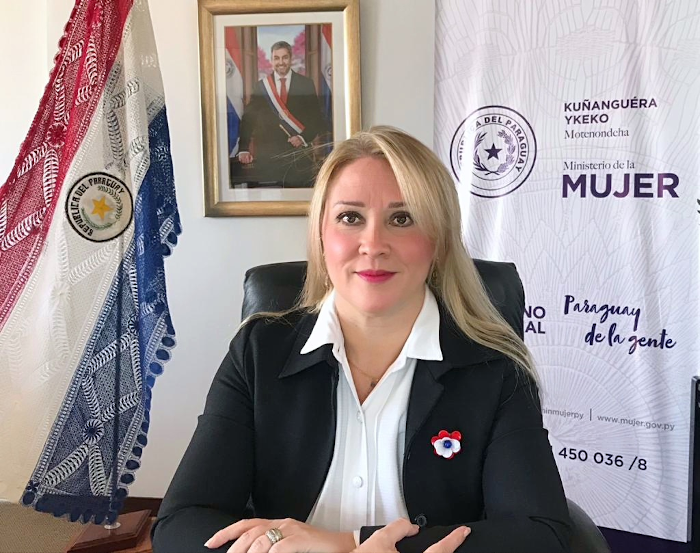-
21 January 2022
Category : Interview
“It is a key moment for consolidating the Care Policy in Paraguay”
We speak with Celina Lezcano, Minister for Women in Paraguay, who tells us about the key points of the formulation of the Care Policy in the country
 Cecilia Lezcano
Cecilia LezcanoIn Paraguay, a sizeable proportion of young women, whose employment is not reflected in the statistics, are dedicated to unpaid work, mainly to do with taking care of the home or their families. Paraguay’s Care Policy was created with the assistance of the Support Programme for the implementation of the 2030 Agenda’s SDG 5, which is committed to empowering women and to gender equality. Paraguay’s Minister for Women, Celina Lezcano, tells us about the importance of its development.
What has lead Paraguay to undertake a Care policy?
Care policies are part of the regional agenda for gender equality from the Quito Consensus to the 2030 Agenda, the SDGs and the Montevideo Strategy. All these commitments are reflected in the IV National Equality Plan. In Paraguay, in 2016, the first time-usage survey was carried out. Using the latter with data that had already been recorded, we could corroborate the regional trend in Paraguay, that women spend more than 50% of their time doing unpaid work. And there is some extremely relevant data: in poor households, women, very often young women, face a greater burden of care tasks than in other households.
The Ministry for Women influenced the government’s main schemes, focusing on people care and principally reflecting on the disparity in co-responsibility regarding unpaid tasks, with a significant weight resting on families and women.
On what pillars will it be based?
The National Government has established as priorities in the social area the configuration and development of a National Social Protection System (SPS). Its objectives are defined according to different phases of life, as well as by the environment and the home. A set of 37 State Organisations and Entities have planned strategic actions for the 2019-2023 period.
The Ministry for Women contributes to two pillars of the Social Protection System: Social Integration and Labour and Productive Inclusion. Non-contributory social policies are included in the Social Integration pillar. In the Labour and Productive Inclusion pillar, that is job placement, there has to be inter-sectoral collaboration between the public and private sector.
Who will this policy be developed for?
Everyone has the right to receive quality care at different times and circumstances in their lives, to provide care under decent conditions and to have alternatives available when they cannot provide care. However, this process will be introduced gradually and progressively. In general, the population groups directly benefiting from it will be young children, people with disabilities who cannot fend for themselves, and older adults in the same situation. And, obviously, also women, both those who until now have carried out these jobs on an unpaid basis, and those who are paid for care provision.
How is the roll-out process going?
The Ministry for Women promoted the creation of the Inter-institutional Group for the Promotion of Public Care Policies in Paraguay (GIPC) in 2018.
It also formulated the Framework Document for the Design of a Care Policy in Paraguay, under the leadership of the Ministry for Women. For this we have the support of the European Union, through EUROsocial+ and the cooperation of UN Women.
The Ministry for Women has a roadmap that is updated annually with the GIPC. For 2021, three implementation phases were provided for, with the support of the European Union (both with the EUROsocial+ Programme and the “Support for the Implementation of the 2030 Agenda” Programme executed by FIIAPP), with the support of UN Women and the Inter-American Development Bank.
The first phase is the presentation of the National Care Policy Bill to the Legislative Branch. The second phase is the formalisation of the Policy. And the third is the National Care Policy in Paraguay.
In addition, Paraguay is joining regional networks that encourage care policies, such as the Network of long-term care policies in Latin America and the Caribbean (RedCuidar+), because on this issue it is very important to enhance the processes under way in each country.
Do you think that Paraguay will be an example for other countries in terms of care?
I believe that this policy has the potential to become an early example within the “VAMOS!Social Protection System ” , but also an example of inter-institutional cooperation, which has passed through different governments thanks to the work of the technical teams that make up the GIPC, turning it into a State policy and not one of a specific government.
How does the Ministry work with the 2030 Agenda Support Programme?
The European Union and FIIAPP Support Programme for the 2030 Agenda includes technical support on construction, socialisation and approval processes for the National Care Policy, since it is part of meeting target 5.4 of SDG 5. They have also supported us in processes of analysis of the context and in mapping actors to better define our planning and that of the GIPC itself, with a view to the Bill’s approval process.
At the head of the Ministry for Women, I find myself at a key time for the consolidation of the Care Policy in Paraguay, assuming the government’s commitment and the goals set with international organisations.
The views and opinions expressed in this blog are the sole responsibility of the person who write them.






